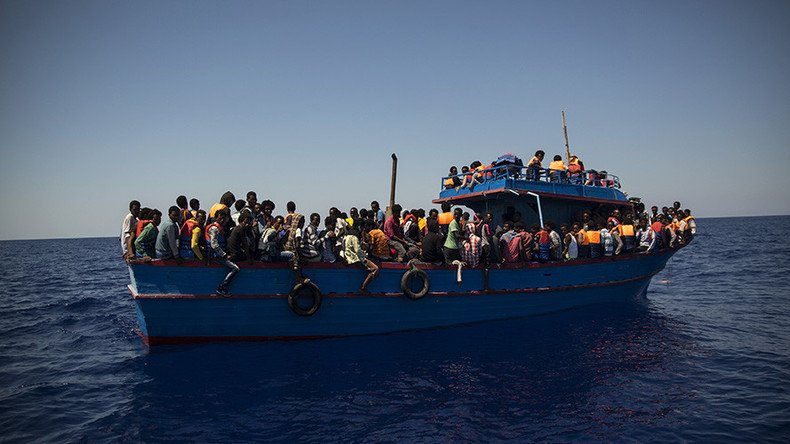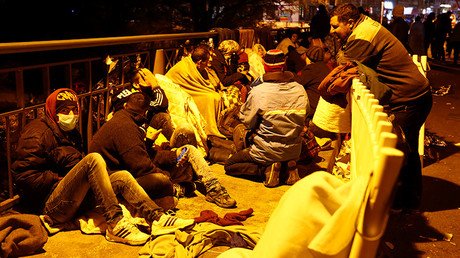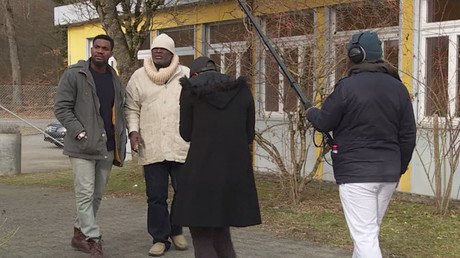Germany creates myth-busting website to deter asylum seekers

Two years after the peak of the refugee crisis, Germany, which has been the most popular European destination for asylum seekers, has decided to dissuade potential new arrivals by launching a website that reveals the truth about hardships they could face.
The German Foreign Ministry launched the website, ‘Rumors about Germany – facts for migrants’, on Monday. The webpage is available in three languages – English, French and Arabic – and features small colorful posts debunking what are called myths and “big lies” about Germany, as well as providing potential migrants and asylum seekers with grim facts about their future lives in the European “dreamland.”
“You may have heard life is easy, but the reality is different,” the site states, noting that those seeking a better life in Europe would most likely have to “return with no money and have to start from scratch” or “face many difficulties.”
The site particularly dampens migrants’ aspirations by informing them that Germany “does not provide a welcome payment” to those arriving on its territory. Neither would the German government provide new arrivals with an apartment or job, the site says, adding that most refugees have to live in crowded mass accommodation centers and are not allowed to work.
Being a particular nationality doesn’t guarantee the right to asylum, nor does being a child, the site warns. It then states that Germany’s “tight” new migration laws allow the authorities to “forcefully remove rejected asylum seekers more easily, especially if they have made false statements in their asylum application.”
The webpage warns that there isn’t even the guarantee that asylum seekers crossing the Mediterranean in an attempt to reach Europe would be rescued, adding that “your chances of being picked up in time are extremely small,” and that such a journey “remains very dangerous and continues to cost thousands of lives.”
At the same time, cheerful green posts promise potential refugees and migrants that they would most likely be found by border patrols while trying to enter a European country illegally, and would definitely be returned to their home countries by force, should their applications be rejected and they refuse to leave voluntary.
The site also informs would-be asylum seekers about other perils they could face on their journey to Europe, such as the risk of being kidnapped by human traffickers or random criminals, which would lead to their relatives being forced to pay a ransom for their release.
Commenting on the launch of the website, Andreas Kindl, the German Foreign Ministry's director for strategic communication, said: “The most important aim of our Rumors about Germany campaign is to not leave the human traffickers’ myths and rumors unchallenged on the internet, but to provide correct information ourselves."
However, the site not only paints a grim picture of a long and perilous struggle to achieve asylum in Germany, but also tells potential asylum seekers about new opportunities and an improving quality of life in their home countries, supported by Germany’s aid and development programs.
The site features such articles as “Stability returns to Iraq,” “Germany creates jobs in the Middle East,” and “Sudan: sowing the seeds of future growth” in an apparent attempt to make potential migrants take a more favorable look at life in their own countries. It also inconspicuously asks if they are “sure about leaving.”
Germany is far from being the first country to turn to the media and advertising in an attempt to stem the flow of refugees and migrants. In March 2016, Austria decided to run a large-scale advertising campaign to deter Afghan asylum seekers from coming to the country.
The campaign featured banner ads on more than 1,000 popular Afghan websites, as well as giant billboards and posters plastered on the sides of buses running in the five biggest Afghan cities. At that time, the Austrian authorities spent as much as €10,000 ($10,867) on the campaign, which featured slogans such as “No asylum in Austria for economic reasons!” and “Smugglers lie! Inform yourself!”
About a year later, Switzerland decided to go even further when it spent $450,000 on filming a TV series with African actors showing the perils of living in Europe illegally. The series was expected to be shown on Nigerian television.
Out of 1.3 million asylum seekers who came to Europe at the height of the refugee crisis in 2015, some 900,000 filed their applications in Germany, which has been perceived as a particularly welcoming location partly due to Chancellor Angela Merkel’s ‘open door’ policy.
The mass influx of refugees and migrants put a strain on the German social welfare system, aggravated the security situation and sparked a rise in anti-migrant sentiment. At the September parliamentary elections, the far-right populist Alternative for Germany (AfD) party enjoyed historic success, while Merkel’s Christian Democrats (CDU) and their Bavarian allies – the Christian Social Union – suffered their worst results in more than half a century.
Establishment parties are now struggling to win back voters from the far-right populists. On October 9, the CDU and its Bavarian sister party agreed to cap Germany’s intake of asylum seekers at 200,000 a year.














